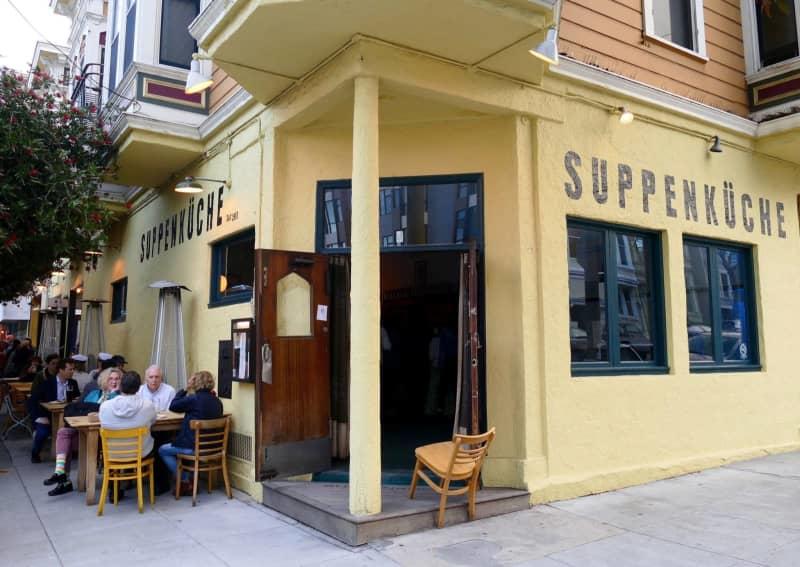Fabrizio Wiest, owner of the “Suppenküche” in San Francisco, lends a hand every day. The native Bavarian, whose nickname is Fabi and who always wears a hat, slides the mop over the green floor. Then he polishes the 30-year-old wooden tables with oil. “I want everything to be spotless. Then flowers are added to make everything look nice,” says the 59-year-old.
His “Suppenküche” has nothing in common with soup kitchens for the needy. The popular restaurant in the West Coast metropolis has been a success story for 30 years. Back in 1993, Wiest, a graphic designer from Munich, and an acquaintance who was an avid amateur chef, dreamed of opening a German inn in California. “It was a crazy idea,” Wiest admits today with a laugh. But the duo took the plunge, in, of all places, a city already regarded as a culinary mecca.
At first, it was just supposed to be called “Soup and Salad,” but then it became the “Suppenküche,” offering Bavarian beer culture along with a hearty menu, from Schnitzel (cutlet) and Sauerbraten (pot roast) to Leberkäse (meat loaf) and Käsespätzle (cheese noodles). The location was an old-fashioned Victorian house from the 19th century, in the then slightly rundown district of Hayes Valley. The building had featured once in a 1924 silent film, Wiest says.
Inside, whitewashed walls under a vaulted ceiling; outside, yellow brickwork with the name Suppenküche written in Bauhaus font and the year of its founding, 1993, in large letters on the wall. “It was a huge success from the start,” Wiest says, looking back. A young audience, artists, and “an insane amount of quirky” people came right away.
The area, close to the opera district, has long since become hip. But the cozy “Suppenküche” has hardly changed at all. Ancient stone jugs, originally from Bavaria, adorn the walls. Among them are framed historic portraits of Bavarian King Ludwig II and US President Abraham Lincoln. Wiest proudly points to an old engraving of Tunzenberg Castle near Dingolfing, where his grandfather used to brew beer.
Bavarian tradition is his mantra. With the long wooden tables where strangers sit together, they brought something completely new to San Francisco back then, he points out. Suddenly, all kinds of people were talking to each other instead of dining in isolation at their own tables. In addition, there were dozens of types of beer, all imported from Germany. For Wiest, the “Suppenküche” has become the perfect showcase for his homeland’s beer culture.
Just after 5 p.m., once the heavy, old wooden doors are opened, diners start trickling in. “I’m a foodie and discovered the restaurant on a best of list,” Juliana Cacciaroni tells me on her first visit. “Cozy here, but not at all stuffy,” is her first impression. A waiter gives friendly advice about the menu. His recommendation: Wiener schnitzel, Jägerschnitzel (escalope chausseur), or Sauerbraten.
The small kitchen is a hive of activity. Potato pancakes sizzle in the pan, schnitzel plates are being garnished, and the potato and cucumber salad is being seasoned. Everything has to be “as traditional as possible,” Wiest says. “We make the Leberkäse according to an old recipe from Lower Bavaria, and we get rolls from a baker here.”
The chef, however, is from the US. “Everyone likes sausages and potatoes, after all,” grins Eric Fletcher. The fact that the “Suppenküche” has been around for 30 years is the best proof of its quality, he says. The most popular dish? Wiener schnitzel, up to 40 orders a night. The most difficult dish? Pork knuckle (Schweinshaxe). “I’ve finally got a handle on that with Fabi’s help,” Fletcher says. “Tender on the inside, but crispy on the outside, not too lean, not too fatty, that’s a real challenge.”
With a team of 30 people, Wiest, now the sole owner, runs the restaurant, plus a beer garden just around the corner. His wife, a Latina from Los Angeles, also helps out. The couple have three children. Recently, their restaurant was named a “legacy business” by the city council. “Simple German cuisine and great beer,” the description says. This designation is awarded to businesses that make a special contribution to neighbourhoods in San Francisco.
In a city with rapidly rising prices and an extremely high cost of living, many businesses are struggling to survive. “It’s always been up and down in San Francisco ever since the Gold Rush,” Wiest says. “Many get very rich, others go bust, and then it just starts all over again.” A currywurst in his beer garden costs $13, a Wiener schnitzel is around $26.50. In a city where a hamburger can cost $30, his dishes are comparatively affordable, Wiest says.
The Suppenküche’s success over three decades proves him right. And what’s his favourite food in his adopted country? “Roast pork, Leberkäse or pork knuckle,” the restaurateur says without hesitation. “I love German food, but it is far too underrated,” muses the Bavarian, speaking in a mix of German and English. One thing is certain – German food is definitely not underrated at the “Suppenküche”.
A cook prepares food in the kitchen of the German restaurant “Suppenküche” which offers more than the soup and salad originally planned. Barbara Munker/dpa

Guests sitting in the outdoor area of the German restaurant “Suppenküche”. San Francisco is known for its many cuisines and restaurants. Of all places, two Bavarians open a pub there – that was 30 years ago. The “Suppenküche” is still a success story today and has moved beyond offering just soup. Barbara Munker/dpa
Read the full article here


